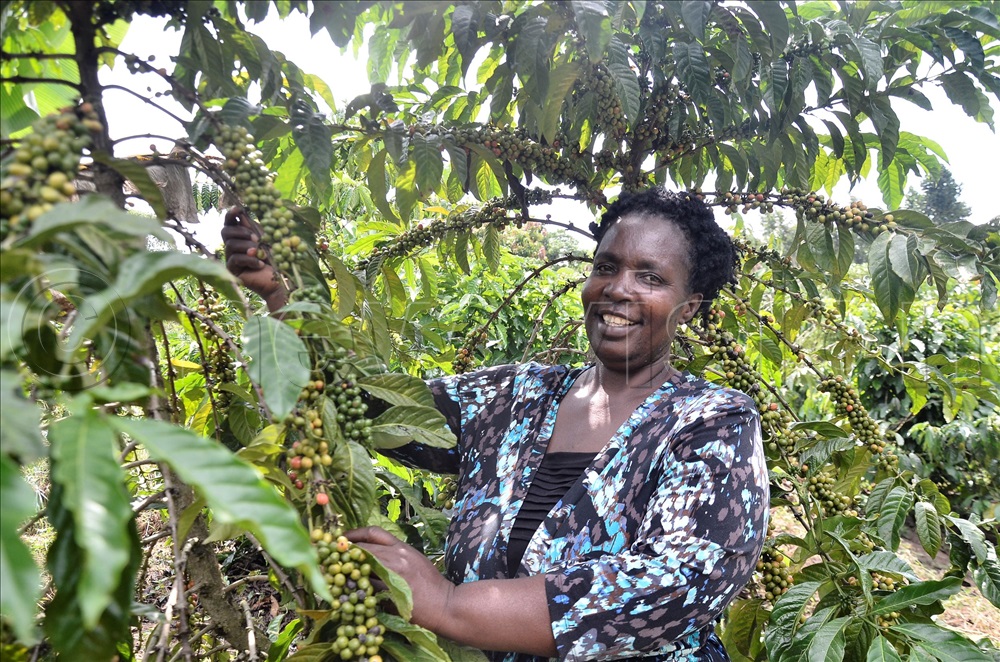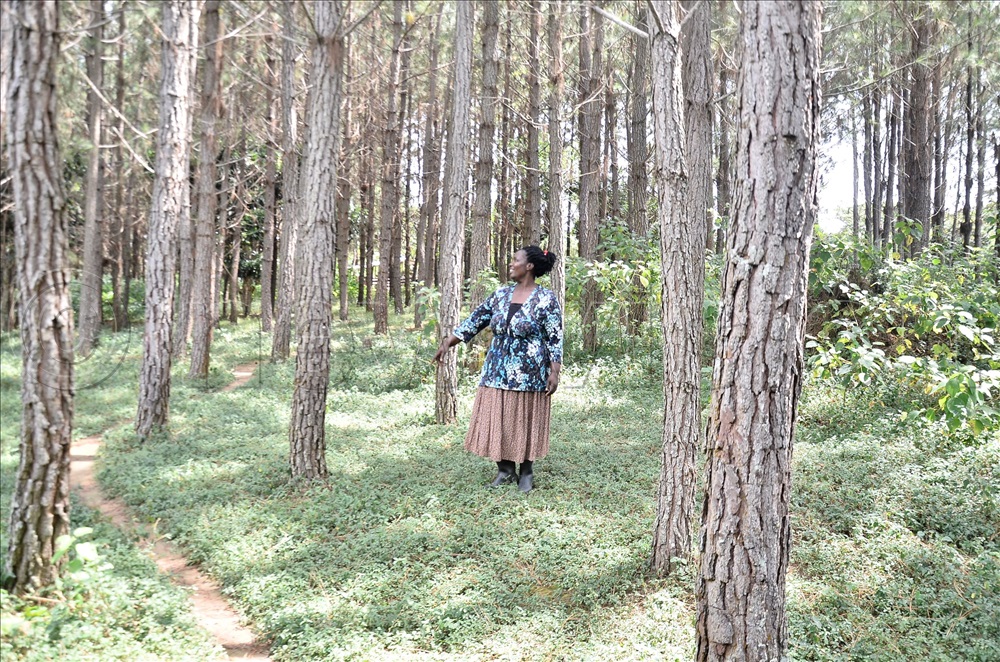By Umar Nsubuga
For the ninth year running, Vision Group, together with the Embassy of the Netherlands, KLM Airlines, dfcu Bank and Koudijs Nutrition BV, is running the Best Farmers Competition. The 2024 competition will run from April to November, with the awards in December. Every week, Vision Group platforms will publish profiles of the farmers. Winners will walk away with sh150m and a fully paid-for trip to the Netherlands.
Because of the relatively quiet ambiance at the entrance of Jenni Integrated Farm, a first-time visitor cannot imagine there is a lot of activity there.
Welcome to Jennifer Tumushabe’s 100-acre farm in Kitagwenda district that has apiculture, agro-forestry, coffee and dairy farming.
The fruit trees are inter-cropped with plantains, coffee and Napier grass, which is used to feed the zero-grazed cows.
How she started
Tumushabe, a 64-year-old resident of Kyabwanswa village, Kicwamba ward in Kitagwenda district, is passionate about her agricultural ventures, especially the honey business.

“I was a primary school teacher and the salary was not enough, so I sought ways of supplementing my meagre pay through farming,” she says.
Explaining further why she chose agriculture, Tumushabe says she grew up in a farming family.
Additionally, her husband, Prof. Fredrick Tumwine, loves farming. Tumwine is a researcher. The couple got married in 1983.
“My husband was saving so we could get more land to add to what he inherited from his father. We now have more than 100 acres,” Tumushabe says.
In 2004, using her savings as a teacher, Tumushabe bought two cows and two goats. At the time, Tumwine was working in Kenya.
“When I told my husband that I was going to start farming and that I had already bought two cows and two goats, he was happy,” she says.
Tumushabe says her husband sent her sh1m, which she added to sh300,000 and cleared 10 acres on which she planted trees, beans and maize.

In 2008, she attended trainings on bee farming organised by Kamwenge Bee Keepers Co-operative Society.
She then ventured into beekeeping, which has become the farm’s biggest enterprise. To attract more bees in the apiary, Tumushabe dips sticks in honey and then puts them along the boundary of the section. The bees get attracted to the honey and fill up the apiary.
“I have also taught members of my household about beekeeping so they can explain the process to any visitors and supervise activities when I am not at home,” she says.
Tumushabe has also hired members of the community to work at the farm.
She says it takes three months for honey to mature.
Tumushabe says the best thing about bees is that you do not have to spend money on buying food for them.
“Keeping bees is the most appropriate way of dealing with poverty for those without a lot of land. It is also one of the best ways to preserve nature because you don’t have to burn or cut down trees. We need to exploit nature and benefit from it economically,” she says.
Tumushabe says the bee enterprise produces many products such as pollen, propolis, royal jelly, beeswax and venom, which are on high demand for their medicinal and food values.
She has not only improved the quality and production of honey in the community, but also mobilised beekeepers into producer groups.
This has enabled them to harvest high quality honey and also realise the benefi ts of other products, especially beeswax and propolis.
Benefits of honey and apiculture
In cold weather or when food sources are scarce, bees use stored honey as their source of energy.
“Honey can be eaten on its own or on bread or pastries. For those watching their calorie levels, honey can be a perfect substitute for sugar,” Tumushabe says.
Today, honey is increasingly becoming an ingredient in exotic cuisines. For example, a puree (mixture of onions, tomatoes and spices) can be enhanced to make it thicker using honey.
Likewise, the inclusion of honey in the making of desserts would be ideal.
“Honey is sweet, so it might not blend well with spices and other ingredients if used in large quantities,” Tumushabe warns.
She notes that honey can speed up digestion.
Honey is composed of glucose and fructose, and minerals like magnesium, potassium, calcium, sodium chlorine, sulphur, iron and phosphate. It contains vitamins B1-2 and C. It also has copper, iodine and zinc in small quantities.
“Apiculture is vital in model farming because bees are the best pollinators. They, therefore, increase productivity of coffee and other crops,” Tumushabe says.
Each of the 10-20 hives can produce 10-20kg of pure honey in a year. At sh10,000 per kilogramme at farm gate price, this translates into sh1-2m.
One can get back the total investment after just one year, yet input in form of labour is low.
A hive can last for as many as 10 years, if well-maintained.
Agro-tourism centre
It is over 10 years since Tumushabe set up a centre to promote agro-tourism, modern agriculture and create jobs for the youth by showing them that farming is lucrative.
“I receive over 30 visitors per month,” Tumushabe says.
She adds that she has trained hundreds of people ever since she started her centre. When Tumushabe learnt that agroforestry increases nectar and pollen for bees by reducing the distance covered by the bees in collecting raw materials for honey, she increased the number of fruit trees at her farm, including grevillea robusta along the boundaries of the farm so bees can visit for nectar.
She also planted avocados, mangoes, guavas and jackfruit. The fruit trees provide shade for the coffee, while at the same time increasing forage for the zero-grazed animals such as goats.
The trees are used in fencing of the paddocks for cattle and the goats. The dry leaves that drop from the branches of the trees are used as mulch for coffee and others crops.
The mature trees are processed into timber for making bee hives and other products.
Livestock
The cows and goats feed on mutuba and acacia leaves. Their excreta is used as organic manure for crops such as maize, beans and cassava, increasing their productivity.
Each goat is sold at between sh250,000 and sh350,000. Tumushabe has 25 head of cattle and three are Friesians that are zero-grazed. The project brings in 160 litres of milk per day.
She sells each litre of milk at sh1,000. Tumushabe constructed a dam so animals can drink to their fi ll and also created water pipes in the farm at sh5m.
She applies the drip technology, where water pours through the pipes to the troughs, enabling the animals to drink at convenience.
Plantain
Tumushabe owns four acres of plantain, which she sells between sh12,000 and sh15,000 a bunch.
She sells five to 10 bunches a month. Tumushabe also grows mangoes, which she sells at sh500 each.
She has over 50 trees at her farm.
“I did a market survey on mangoes in the towns of Kitagwenda and Fort Portal in 2015, and discovered that it was profi table,” she says.
In early 2016, she bought the seedlings and began to plant.
Coffee
On average, Tumushabe’s farm produces 20 bags, which are 100kg of fresh coffee. After removing the pulp, she gets 15 bags.
A kilogramme of depulped arabica coffee goes for sh6,500. In a season, Tumushabe, earns between sh5m and sh10m.
Training
Tumushabe says when she was starting the project, she wanted to be able to share farming knowledge with the community.
“My trainings are undertaken in the following aspects; basic strategies of poverty reduction, integrated farming with emphasis on the quarter model, improved bee farming, modern local chicken rearing, kitchen gardening and different types of manure,” she says.
Environment protection
So far, Tumushabe has pine on 30 acres and eucalyptus on 10 acres.
She says this is her contribution to fi ghting climate change.
“I earn from timber and electric poles. This project brings in sh10m to sh50m a year.
Labour force
Tumushabe employs six workers. She pays her farm manager sh250,000 and others are paid sh150,000. The casual workers are paid between sh6,000 and sh10,000.
Tumushabe keeps a record of all farm activities – the expenditure and profi ts.
“I sit with my husband every Sunday to balance the books and we deduct the expenditure from the total income earned,’’ she says.
Achievements
“I have installed solar equipment for domestic lighting and other purposes, like water pumping. I have also bought a new car for transporting my produce to markets,” she says.
Tumushabe lists some of her challenges as cattle diseases and pests such as ticks and tsetse flies.
‘‘Most of the drugs for pests and diseases sold in Uganda are not genuine, while others are substandard,’’ she notes.
The unpredictable weather and market are also a challenge.
Plans
With the support of her husband and children, Tumushabe plans to evolve her agriculture fruit forest into a learning model for climate-resilient agriculture.
What others say
Grace Kyatuka, neighbour Tumushabe’s farm has led to the rapid growth of Kyabwanswa village. Every homestead now has a fruit tree because Tumushabe’s farm is an agro-tourism centre.
Geoffrey Guma, community member Tumushabe’s agro-tourism centre gives a special treat to tourists, who visit a number of farm sections.
Visitors participate in agricultural activities alongside members of the household.
LEAD PHOTO CAPTION: Tumushabe holding a five litre jerrycan of honey. She each at sh150,000. Photos by Umar Nsubuga





